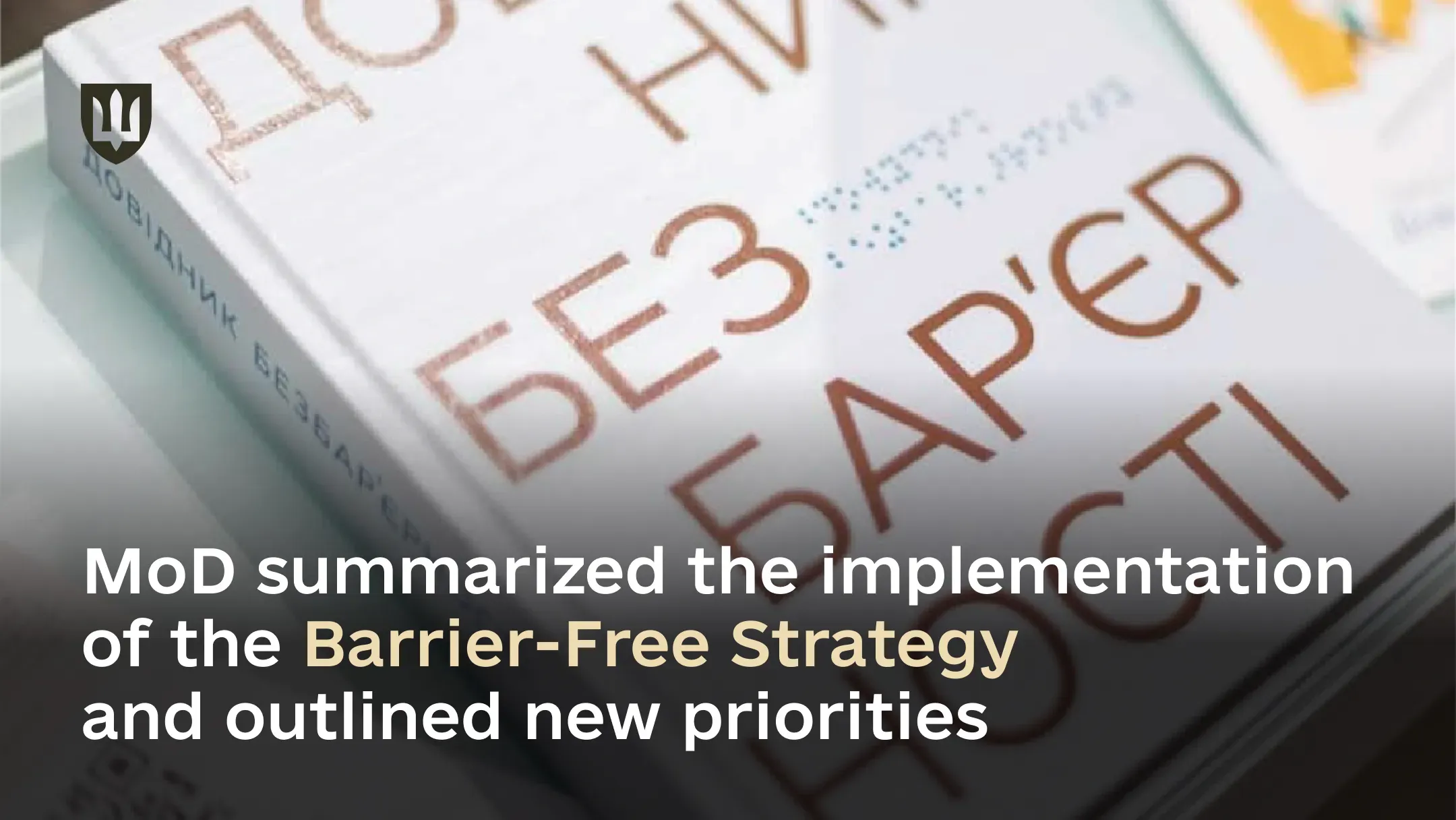The Ministry of Defence summarized the implementation of the Barrier-Free Strategy in 2023–2024 and outlined new priorities

The Ministry of Defence of Ukraine held a working meeting with the Presidential Commissioner for Barrier-Free Environment, Tetiana Lomakina, and relevant non-governmental organizations. The participants discussed the projects already implemented by the Ministry of Defence in 2023–2024 under the National Strategy for Creating a Barrier-Free Space through 2030, as well as plans for the current year.
During the event, the interim results of implementing barrier-free solutions in the defense sector were assessed, current challenges were discussed, and further priorities were outlined.
Opening the meeting, Lieutenant General Yevhen Moisiuk, Deputy Minister of Defence of Ukraine, emphasized the importance of systemic transformation within the military.
“The Ministry of Defence approaches barrier-free accessibility with the utmost seriousness and responsibility. We are fostering a new culture of mutual respect, equality, and consideration for the needs of every individual,” said Lieutenant General Yevhen Moisiuk.
According to Lieutenant General Yevhen Moisiuk, a concept for reconstructing 25 medical facilities across 11 regions of the country has been developed. These projects include the installation of elevators, automatic doors, and the adaptation of facilities in accordance with barrier-free principles.
Additionally, standard military uniforms for women have been introduced, women’s body armor tailored to anatomical features has been certified, and testing of adaptive clothing for wounded personnel has begun.
Lieutenant General Yevhen Moisiuk also emphasized that the principles of barrier-free accessibility are being implemented in close coordination with civil society and international partners: “The Ministry does not work in isolation — we actively cooperate with non-governmental organizations, veteran-led initiatives, and international partners.
“Since the beginning of this year, we have been actively working on a social support program for military personnel and their families. Barrier-free accessibility is not solely a technical or infrastructural matter. At its core, this is about creating an inclusive environment and fostering a mindset that ensures equal opportunities for all to serve, work, and develop,” emphasized Lieutenant General Yevhen Moisiuk.
Presidential Commissioner for a Barrier-Free Environment Tetiana Lomakina noted the significant progress achieved by the Ministry of Defence in implementing the National Strategy. “The Ministry of Defence has already made significant progress in implementing the Barrier-Free Strategy. You are well-positioned to take a leadership role among other ministries.”
During the presentation of key achievements, Captain Maksym Balatsenko, Deputy Head of the Humanitarian Support Department, outlined the main highlights.
In medicine and rehabilitation, medical facilities in eight cities were reconstructed to meet barrier-free standards; a health information system was introduced in 31 facilities; expert teams for evidence-based rehabilitation were formed; and a government resolution was approved to provide adaptive clothing for the wounded.
In the area of gender equality, technical specifications for women’s undergarments — including cold-weather designs — have been approved, and more than 71,000 summer field uniforms have been delivered. Furthermore, the number of women serving in the Armed Forces of Ukraine has increased by 23% since the onset of the full-scale invasion, with more than 70,000 female service members currently serving.
Within the digital domain, the Ministry of Defence’s official website has been upgraded to conform to international accessibility standards, alongside the development of online courses and educational programs for distance learning.
Special attention was given during the meeting to the results of a survey conducted through the Army+ app, in which over 14,000 service members participated. Most respondents indicated an understanding of the principle of barrier-free access; however, the survey highlighted the need to improve awareness and communication on this topic.
The meeting participants emphasized the importance of dialogue with service members on challenging issues and the need for their timely resolution. They agreed to further strengthen interagency cooperation—particularly with the Ministry of Veterans Affairs—to ensure continuous support during service members’ transition to veteran status.